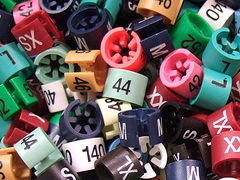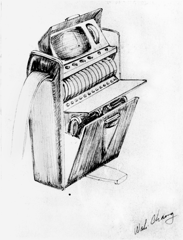Where’s the Universal Self-Tracking Gadget?
Matthew Cornell
October 29, 2010
 A few months ago I was fatigued and decided to try a more rigorous sleep hygiene routine to see if it would help (it did). To make the experiment fun I thought I’d look for a nifty iPhone app to track the data. After a fairly extensive search I noticed that most of the tools were either highly specialized to a domain (e.g., Sleep On It), or more general purpose (e.g., iLogger). This got me wondering about why there isn’t a universal self-tracking gadget, and what one might look like.
A few months ago I was fatigued and decided to try a more rigorous sleep hygiene routine to see if it would help (it did). To make the experiment fun I thought I’d look for a nifty iPhone app to track the data. After a fairly extensive search I noticed that most of the tools were either highly specialized to a domain (e.g., Sleep On It), or more general purpose (e.g., iLogger). This got me wondering about why there isn’t a universal self-tracking gadget, and what one might look like.
Below I sketch some ideas on what such a beast would need to do to support any data-driven effort. I’d love to know if this makes sense to you, and what you think. (Note: I’m excluding memories for life applications such as Gordon Bell’s MyLifeBits.)
Overall functionality
Regardless of the particular domain – sleep, exercise, mood, sex, reading, etc. – is there a set of common tools and sensors that could satisfy the majority of data-driven activities? Overall the goal would be to help answer the types of questions we ask when self-experimenting. That is, to help us discover useful patterns. The kinds of things it would need to “know” include:
- Physiological state: Physical context like pulse and temperature. (What’s going on in your body?)
- Mental state: Cognitive context like thinking patterns, mood, and happiness. (What are you thinking? How do you feel?)
- Location: Spatial context like transitions, surroundings, environment, and activity. (Where are you? What’s going on around you? Where are you going?)
- Incidents: Temporal context like performing exercise, taking medication, attending an event, or eating. (What did you just do?)
- People: Social context (Who are you with? What interactions are you having?)
How would it collect these things? I don’t have all the answers, but I’m thinking of three sources: Direct measurement, inference, and self-reporting. The first category, direct measurement, clearly is collected by sensors, and there is exciting progress on this front. See Measuring Vital Signs From 40 Feet Away or NASA Adapts iPhone to Detect Chemicals, for example.
I’m less sure about the second category, inference, but I’m thinking of tools that deduce some of the above, such as “You’re asleep” (zeo), “You’re at work” (Skyhook), “You’re at a party” (iCal), or “You’re around someone interesting” (MeetMoi).
The final category is the most applicable to self-tracking, but also the most problematic. The closest concept I could find was Wikipedia’s Self-report inventory entry, but the gist is there’s a lot we have to report explicitly. Think of anything you’ve tracked in the above contexts and you’ll come up with plenty of examples, such as “I feel great,” “I drank a beer,” or “I just had an argument with my spouse.” This category is problematic because self-reporting is biased, and because it requires manual input (see Gary’s Which is Better: Automated or Manual?).
I think it’s this last category of data capture that’s generally applicable to most self-tracking needs. Putting on my computer science hat, it seems there’s a fixed set of data types that we’d need. The typical ones include itemized lists (mood from 1 to 5 stars, or yes/no), counts (number of push ups), durations (minutes of exercise), number (weight in pounds), and text notes. All would be time-stamped, of course.
Pros and cons of specialized vs. general
Nothing comes for free, so what would be the trade offs of using a general-purpose data capture device? The pros are that there’d be no reinventing the wheel, everyone would know how to use it, and manufacturing economies of scale would be possible. Also, if we assume a open data access API then any site could use the data, enabling custom uses, novel visualizations, and social applications.
For cons, just look at Alex’s roundup series of “vertical” tracking tools: food, location, fitness, and mood. Because these are specialized to their domain they offer benefits like precise language, customized input (such as eCBT Mood), inferred measurements, and inbuilt information such as a food/calorie database.
Workarounds are possible and would be driven by an experimental design perspective. Self-trackers would set up their experiments by specifying types of measurements, units, frequency of capture (including reminders), and measurement groupings. (An example of the latter is needing to capture a set of daily mood chart data in one shot, like exercise, medications, menses, energy, and agitation level.) By making the gadget’s UI “skinnable” we could generate interfaces automatically for each experiment.
Usage characteristics (or Why your phone should be a Tricorder)
 So what would the thing actually look like? In addition to the physical sensors, there are characteristics required for a universal data-tracker to be usable. What comes to mind are ubiquitous availability, rapid manual entry, and notifications to the senses (“What’s that smell? Oh, it’s time to check if I’m procrastinating.”)
So what would the thing actually look like? In addition to the physical sensors, there are characteristics required for a universal data-tracker to be usable. What comes to mind are ubiquitous availability, rapid manual entry, and notifications to the senses (“What’s that smell? Oh, it’s time to check if I’m procrastinating.”)
Fortunately we have a classic model to start with – the venerable Star Trek Tricorder. It was portable, had powerful recording and analysis capabilities, and could measure things like environmental make-up, life forms, and power sources. Combining the general-purpose and medical variants into your cell phone (the de facto does-it-all device), and adding additional sensors and controls (real buttons, please – much faster than touch screens), wouldn’t we have something that self-trackers would love?
A catalyst for citizen science?
Inspired by Kevin’s conclusion in A Web Page For Every Species, I wonder if having a universal device for self-experimentation could launch self-tracking for all.
As he puts it,
When anyone can buy a hand held species identifier, an amazing transformation will take place: everyone will become a taxonomist.
Could this be true for individual experimentation? Would everyone become a personal scientist? It’s exciting to imagine this kicking off a widespread movement to fulfill the promise of citizen science and social self-improvement. What would be the result, and how might that change how we interact with ourselves, each other, and the world?
What do you think?
- Is such a gadget possible?
- Would it apply to most self-tracking apps, or would it be too general?
- Do you use a general purpose app? How has it worked for you?
- Do you see it drawing people into the experiment-driven life?
[Images from Ralph Aichinger and TK560]
(Matt is a terminally curious ex-NASA engineer and avid self-experimenter. His projects include developing the Think, Try, Learn philosophy, creating the Edison experimenter’s journal, and writing at his blog, The Experiment-Driven Life. Give him a holler at matt@matthewcornell.org)


